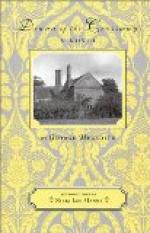CHAPTER XV
INTRODUCES THE HON. PERCY DACIER
The Gods of this world’s contests, against whom our poor stripped individual is commonly in revolt, are, as we know, not miners, they are reapers; and if we appear no longer on the surface, they cease to bruise us: they will allow an arena character to be cleansed and made presentable while enthusiastic friends preserve discretion. It is of course less than magnanimity; they are not proposed to you for your worship; they are little Gods, temporary as that great wave, their parent human mass of the hour. But they have one worshipful element in them, which is, the divine insistency upon there being two sides to a case —to every case. And the People so far directed by them may boast of healthfulness. Let the individual shriek, the innocent, triumphant, have in honesty to admit the fact. One side is vanquished, according to decree of Law, but the superior Council does not allow it to be extinguished.
Diana’s battle was fought shadowily behind her for the space of a week or so, with some advocates on behalf of the beaten man; then it became a recollection of a beautiful woman, possibly erring, misvalued by a husband, who was neither a man of the world nor a gracious yokefellow, nor anything to match her. She, however, once out of the public flames, had to recall her scorchings to be gentle with herself. Under a defeat, she would have been angrily self-vindicated. The victory of the ashen laurels drove her mind inward to gird at the hateful yoke, in compassion for its pair of victims. Quite earnestly by such means, yet always bearing a comical eye on her subterfuges, she escaped the extremes of personal blame. Those advocates of her opponent in and out of court compelled her honest heart to search within and own to faults. But were they not natural faults? It was her marriage; it was marriage in the abstract: her own mistake and the world’s clumsy machinery of civilization: these were the capital offenders: not the wife who would laugh ringingly, and would have friends of the other sex, and shot her epigrams at the helpless despot, and was at times—yes, vixenish; a nature driven to it, but that was the word. She was too generous to recount her charges against the vanquished. If his wretched jealousy had ruined her, the secret high tribunal within her bosom, which judged her guiltless for putting the sword between their marriage tie when they stood as one, because a quarrelling couple could not in honour play the embracing, pronounced him just pardonable. She distinguished that he could only suppose, manlikely, one bad cause for the division.




